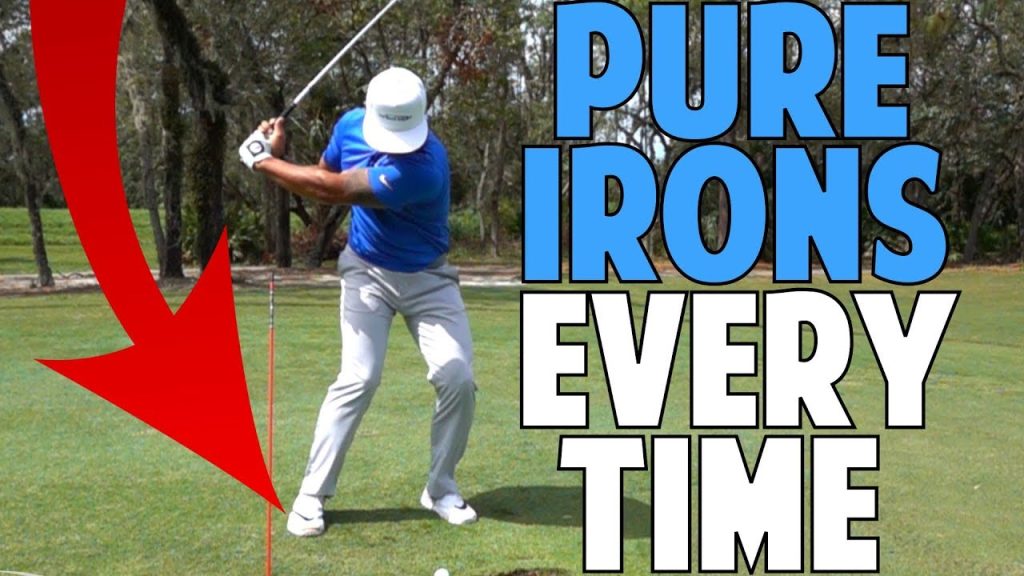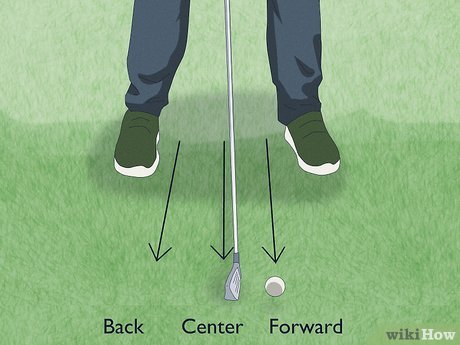Have you ever wondered why some golfers effortlessly strike their irons pure, with that crisp, satisfying sound? This ability to consistently hit irons with precision might seem elusive, especially if you find yourself frequently scraping the ground or slicing the ball. Golf, a game rich with history and nuance, offers you numerous challenges and one of the most significant is mastering your iron play. Here, you will find detailed techniques and insights to help you hit iron shots pure every time.
Understanding the Basics of Iron Play
Before delving into specific techniques, it’s crucial to understand the fundamentals of iron play in golf. These basics form the bedrock of your ability to hit pure iron shots, and without them, any advanced tips are unlikely to have lasting success.
The Purpose of Iron Shots in Golf
Irons are designed for precise shots when you are approaching the green or correcting the ball’s position. Generally, irons are used for mid to short-range shots, and the key to their effectiveness lies in the combination of loft and accuracy. You should aim to strike the ball cleanly, achieving a balance between distance and control.
The Role of Iron Loft
One of the primary features that distinguish irons from each other is their loft, which affects the trajectory and distance of your shot. Understanding each iron’s loft will help you make informed decisions on the course, using the right club for every situation. Lower-lofted irons like the 3-iron deliver more distance, while higher-lofted clubs like the 9-iron offer more height and stopping power on the green.
Ball Position in Your Stance
The position of the ball in your stance is a fundamental that dramatically affects your ability to hit pure iron shots. Generally, the ball should be slightly forward of center for longer irons, and progressively move toward the center as you transition to shorter irons. Proper ball position ensures that your swing makes clean contact with the ball before hitting the ground, leading to that coveted pure strike.
Technique is Paramount
Your technique is the cornerstone of hitting pure iron shots. Developing a sound, repeatable swing will enhance your consistency and results on the golf course, ultimately improving your performance and enjoyment of the game.
Establishing a Solid Grip
A proper grip is vital for a controlled and effective swing. Your grip should be firm but not too tight, aligning your knuckles and ensuring that both hands work together as a single unit. A common method is the overlapping grip, where the pinky of your trailing hand overlaps the index finger of your lead hand. This grip promotes cohesion between the hands, reducing tension and allowing for a smooth swing.
Proper Stance and Alignment
Your stance and alignment contribute significantly to your ability to hit consistent iron shots. Begin by positioning yourself with your feet shoulder-width apart, allowing for a stable base. Your alignment should parallel the target line, with your shoulders, hips, and feet pointing in the same direction. Maintaining a slight bend in your knees and tilting slightly at the waist ensures balance throughout your swing.
Mastering the Backswing
The backswing sets the stage for a successful downswing and impact. Initiating your backswing with a slow, controlled movement helps maintain balance and rhythm. Your shoulders should turn naturally, with your arms lifting the club to the top of the backswing. At this point, your hands should be above shoulder height, and the clubface should point skyward.
Executing the Downswing
Transitioning from your backswing to your downswing requires fluidity and precision. Focus on leading with your lower body, allowing your hips to guide your movement. As you progress into the downswing, your arms follow naturally, and the club should make contact with the ball first before hitting the ground. This sequence of movement generates power while ensuring a clean strike.
The Importance of Follow-Through
A complete, balanced follow-through is a sign of a well-executed iron shot. After impact, your body should rotate naturally toward the target, with your weight shifting onto your lead foot. Your hands should finish high, and your eyes should remain focused on where the ball was, discouraging premature head movement that can lead to mishit shots.

Mental Aspects of Hitting Pure Iron Shots
Golf is as much a mental game as it is a physical one. Cultivating the right mindset can significantly enhance your performance, enabling you to execute pure iron shots consistently.
Staying Focused
Distractions can quickly derail your swing, leading to poor contact and missed opportunities. Develop a pre-shot routine that helps you concentrate on the task at hand, effectively blocking out external influences. Whether it’s a few deep breaths, visualizing the shot, or rehearsing your swing, find a routine that primes you for focus.
Managing Pressure
Pressure situations can amplify errors and breed tension, negatively affecting your ability to hit pure shots. By remaining calm and composed, you improve your chances of executing your best swing. One method to manage pressure is to focus on the process rather than the outcome, allowing you to channel nervous energy into a fluid swing.
Building Confidence
Confidence is an essential ingredient in executing great iron shots. Cultivating self-belief starts on the practice range, where you can hone your skills and develop a sense of mastery over your swing. The more you practice, the more confident you become, leading to better performance on the course.
Addressing Common Mistakes
Even experienced players can fall into habits that diminish the quality of their iron shots. By identifying and correcting these common errors, you can enhance your ability to hit pure strikes consistently.
Hitting Fat or Thin Shots
One of the most prevalent issues with iron shots is hitting the ball fat (hitting the ground before the ball) or thin (striking the ball at the top). Ensuring proper ball position and maintaining your posture throughout the swing can significantly reduce these errors. Additionally, focusing on striking down on the ball instead of trying to lift it will create better contact.
Slicing or Hooking
Slicing (curving the ball to the right for right-handed players) and hooking (curving the ball to the left) are often the result of swing path and clubface angle at impact. A neutral grip, correct alignment, and attention to the mechanics of your swing path can mitigate these issues, resulting in straighter shots.
Overthinking the Swing
While it’s essential to understand swing mechanics, overthinking can lead to paralysis by analysis, preventing you from executing a fluid swing. Trust in your practice and allow your swing to happen naturally rather than forcing it.

Practicing for Perfection
Consistent practice is vital for improving your iron play. Focused practice sessions allow you to embed the techniques discussed, building muscle memory and confidence in your ability to hit pure iron shots.
Drills to Enhance Your Swing
Incorporating drills into your practice routine is a practical way to isolate and improve different aspects of your swing. Here are a few drills to consider:
- Alignment Drill: Lay two clubs on the ground – one along the target line and the other parallel to it, aligning with your feet. This visualization helps ensure proper alignment during practice.
- Impact Drill: Use a line of tees set low in the ground and practice contacting the tees with your swing. This drill reinforces proper impact position and encourages a downward strike.
- Tempo Drill: Practice swinging with a metronome or count out a rhythm during your swing to develop a steady tempo, a critical component of consistent iron shots.
Simulating Course Conditions
Practicing under varied conditions simulates the challenges faced on the course. Vary your targets, use different irons, and practice on slopes or in windy conditions to build adaptability and confidence in a variety of situations.
Tracking Progress
Monitoring your progress over time can offer valuable insights into areas for improvement. Use video analysis to review your swing, noting changes and developments in your technique. Recording distances and accuracy of your shots provides measurable data to assess your improvement.
Leveraging Equipment for Better Performance
While technique and mental focus are crucial, having the right equipment can enhance your ability to hit pure iron shots. Choosing clubs tailored to your style and skill level will aid your performance significantly.
Club Fitting Considerations
A professional club fitting can provide insights into the best club specifications for your game. Factors like shaft length, grip size, lie angle, and clubhead design can all affect your ability to hit pure iron shots. Custom-fitted clubs can complement your natural swing tendencies, leading to better consistency and performance.
Understanding Club Technology
Modern irons incorporate advanced technology that aids in better performance. Features like perimeter weighting, cavity backs, and forged clubheads offer varying levels of forgiveness and feel. Understanding how these technologies work can help you select irons that best suit your game.

Conclusion
Mastering the art of hitting pure iron shots involves a harmonious blend of technique, mental focus, and equipment. By understanding the fundamentals, refining your swing mechanics, and addressing common mistakes, you pave the path toward consistent, satisfying iron play. Remember, practice is the key to unlocking your potential, allowing you to step onto the course with confidence and poise. As you continue to refine your skills, the rewards of pure iron shots await, ready to elevate your enjoyment and success in the game of golf.

Ed Baucom is a passionate and dedicated golfer with years of experience both on and off the course. Known for his insightfulness and attention to detail, Ed brings a wealth of knowledge to the golfing community, particularly through his reviews for Golf Aid Advisor. His expertise in evaluating golfing equipment, training aids, and techniques has made him a trusted voice for golfers seeking to improve their game. Whether testing the latest clubs or offering advice on swing mechanics, Ed’s thoughtful and practical assessments help players of all skill levels enhance their performance.

